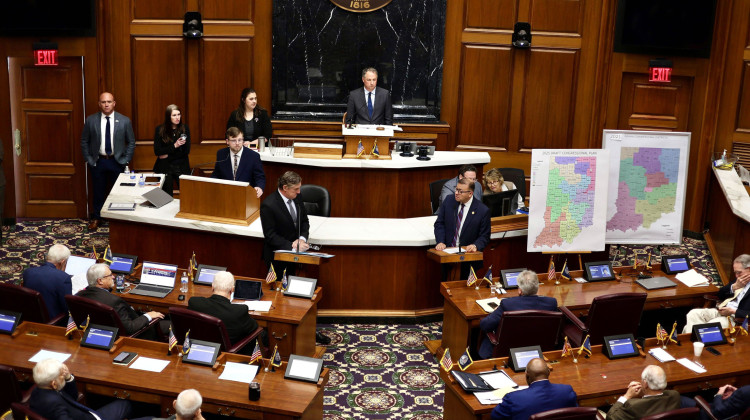
This map of Indianapolis shows redlined districts. Indiana housing organizations are weighing the pros and cons of proposed changes to the Community Reinvestment Act.
Courtesy of the National ArchivesIndiana housing organizations are weighing in on proposed changes to a federal law intended to get banks to invest in historically redlined communities.
Comments closed earlier this month on changes to the Community Reinvestment Act, a 1977 law that rates banks based on investments they make into middle and low-income neighborhoods. Essentially, the ratings were intended to incentivize banks to “meet the credit needs” of the communities they existed within.
The law was one of several housing laws passed in the 1960s and 70s aimed at reducing the effects of redlining – the process of segregating neighborhoods either through explicit racial covenants or the refusal by banks to grant loans, mortgages, or insurance to minority borrowers or in predominantly minority neighborhoods.
Andrew Bradley is the policy director for Prosperity Indiana. He said he supports the proposed changes – but wants banks to be rated explicitly based on racial lending practices.
“While CRA has had this emphasis on low to middle-income communities it doesn’t really have this test to prove that banks and other lenders are serving peoples of color,” he said.
A report from the Fair Housing Center of Central Indiana earlier this year found that the number of Black homeowners in Marion county has declined by 20 percent over the last decade.
A similar report from SAVI found that home loan denial rates in Indianapolis were much higher among Black applicants than white applicants – regardless of credit profile.
Bradley pointed to those declining homeownership rates as evidence that a more targeted Community Reinvestment Act is needed.
“If residents aren’t able to have access to the lending necessary to purchase a home then we’re never going to achieve the type of equity we want in terms of home ownership,” he said.
Other Indiana housing organizations also raised concerns about the proposed changes.
Marie Morse is the executive director of Homestead CS, a home buyers counseling center based in Lafayette. She said the proposed changes would loosen some of the requirements on smaller banks while tightening requirements on large banks. That change is concerning for more rural districts like hers.
“I don’t want that to happen because what we have is smaller banks. I want them still to be accountable,” she said.
But Morse praised some of the proposed changes to the act – specifically around online lending.
The Indiana Bankers Association did not respond to a request for comment.
A spokesperson for the Federal Reserve said there is no clear timeline for when the final rule will be released, but comments made on the proposed changes are currently being reviewed.
 DONATE
DONATE







 Support WFYI. We can't do it without you.
Support WFYI. We can't do it without you.